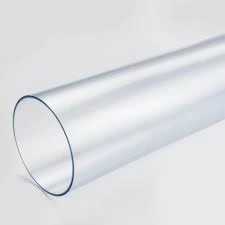Dec . 05, 2024 16:19 Back to list
Understanding the Properties and Applications of PVC Chemical Pipes in Industry
The Role of PVC Chemical Pipes in Modern Industries
In an era where industries are increasingly prioritizing efficiency, durability, and cost-effectiveness, PVC (Polyvinyl Chloride) chemical pipes have emerged as a significant solution across various sectors. Known for their versatility and robustness, these pipes are utilized in applications ranging from agricultural irrigation to chemical processing, showcasing their essential role in modern industrial practices.
PVC chemical pipes are primarily made from polyvinyl chloride, a synthetic plastic polymer that is both cost-effective and durable. The manufacturing process of PVC involves polymerizing vinyl chloride monomer, which results in a material that is lightweight yet strong. This unique combination of properties makes PVC an excellent choice for transporting various chemicals safely and efficiently.
The Role of PVC Chemical Pipes in Modern Industries
Moreover, PVC pipes exhibit excellent chemical resistance, which allows them to be used in a wide range of applications, including the transportation of acids, bases, and solvents. This feature is crucial for industries such as petrochemicals, pharmaceuticals, and wastewater management, where the safe handling of hazardous materials is paramount. As regulations surrounding chemical transport become stricter, the demand for reliable materials like PVC pipes is on the rise.
pvc chemical pipe

In addition to their chemical resistance, PVC pipes are also lightweight and easy to install. This attribute reduces labor costs and installation time, making them an attractive option for contractors and engineers. The ease of handling PVC pipes allows for greater flexibility in design and can lead to more efficient system layouts. Additionally, the smooth interior surface of PVC pipes minimizes friction, which enhances fluid flow and further improves system efficiency.
Environmental sustainability is another crucial factor driving the adoption of PVC chemical pipes. The production of PVC involves fewer greenhouse gas emissions compared to other materials like metal and concrete. Furthermore, PVC is recyclable, and many manufacturers are incorporating recycled materials into their products, contributing to a circular economy. By choosing PVC pipes, companies not only satisfy their operational needs but also demonstrate their commitment to environmental responsibility.
Despite the many advantages of PVC chemical pipes, it is essential for users to consider the specific requirements of their applications carefully. Different grades of PVC are available, each designed to withstand unique pressures, temperatures, and chemical exposures. Manufacturers often provide detailed specifications to guide users in selecting the appropriate pipe for their particular needs.
In conclusion, PVC chemical pipes play a vital role in various industries by providing a durable, cost-effective, and efficient solution for transporting chemicals. Their resistance to corrosion, lightweight nature, ease of installation, and environmental benefits make them a preferred choice across many applications. As industries continue to evolve and seek innovative materials to enhance their operations, the importance of PVC chemical pipes will undoubtedly grow, solidifying their place in the future of industrial infrastructure. By prioritizing safety and sustainability, these pipes not only protect assets but also contribute positively to the environment, making them a win-win solution for businesses worldwide.
-
Premium PVC-M Water Supply Pipe - Durable & Efficient
NewsAug.02,2025
-
Premium PP Welding Rod: GPT-4 Turbo Enhanced
NewsAug.01,2025
-
HDPE Drainage & Irrigation Pipe - Durable, Efficient Solutions
NewsAug.01,2025
-
Premium PVC Transparent Pipe: Durable & Clear Solutions
NewsJul.31,2025
-
High-Quality UPVC Electrical Pipe for Safe Wiring Solutions
NewsJul.30,2025
-
Premium PVC Pipe Fitting Supplier – Durable & Leak-Proof Solutions
NewsJul.30,2025

